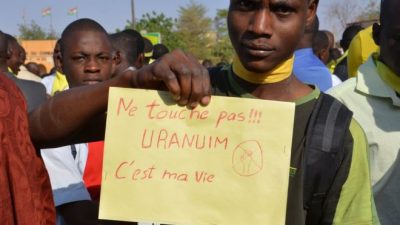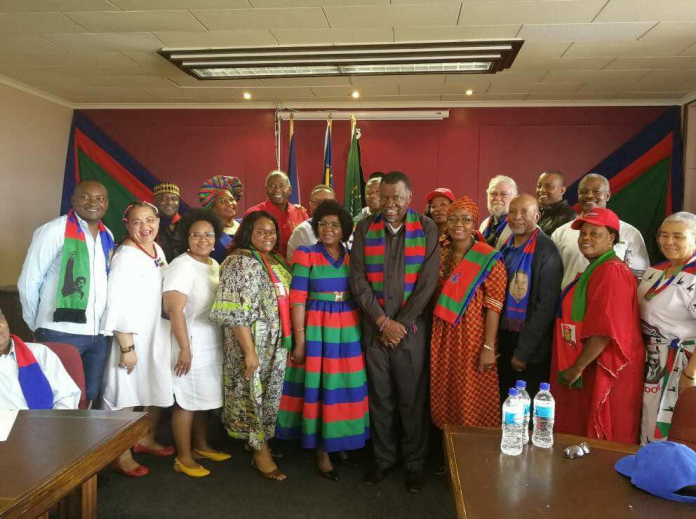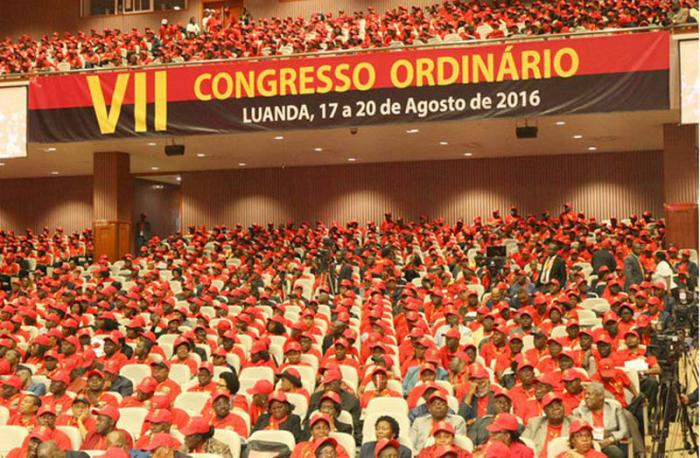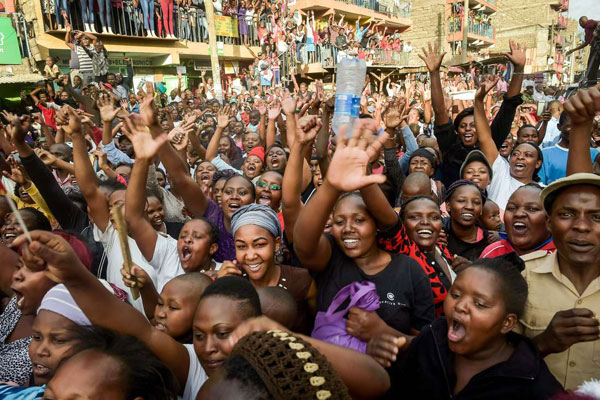
Featured image: Niger protest against corruption within the Uranium industry during 2017
A military engagement in the West African state of Niger involving United States Green Berets in an apparent firefight with hostile forces resulted in the deaths of four Pentagon troops in October.
These casualties were a manifestation of the increasing role of the U.S. Africa Command (AFRICOM) which will be entering its second decade of operation in February. The reasons behind the Niger deployment and the circumstances surrounding the deaths of the American soldiers are not at all clear to many people in both Africa and particularly in the U.S.
One of the Green Berets killed was of African descent. Sgt. LaDavid Johnson’s death in his ancestral homeland became of point of contention between President Donald Trump, the family of Johnsonand U.S. Congresswoman Frederica Wilson of Florida. Wilson took exception to the cavalier and insensitive manner in which Trump spoke with women in Johnson’s family prompting the president to suggest that the slain soldier’s family along with the Congresswoman were dishonest.
White House Chief of Staff General John Kelly provided political backup for Trump’s denial of being dismissive to the family of Johnson. Wilson was described by Trump as a failed politician with no merit in regard to her observations of his behavior.
Moreover, the real questions related to why are Pentagon troops stationed in Niger and the actual context under which the AFRICOM troops were killed are not asked by the western corporate and government-controlled media. This incident was not at all an accident due to the fact that U.S. troops are constructing drone launching installations and other so-called counter-terrorism measures in Niger.
The country is an underdeveloped former French colony with one of the world’s largest deposits of uranium. Uranium resources are owned and mined by a French-based firm, Areva, therefore making its natural resources a cause of concern for the imperialist states including Paris and Washington. Areva was interestingly cleared in a 2017 investigation surrounding a major scandal involving the failure to pay market rates for the extraction of this valuable export. (See this)
This presence of Pentagon and French military personnel in Niger is indicative of the ever-widening AFRICOM and NATO efforts to maintain control over the land, resources, labor and waterways of the African continent. Throughout the Economic Community of West African States (ECOWAS) region AFRICOM is active in conducting joint maneuvers with national armies and navies which are ostensibly designed to enhance the security capacity of the various member-states. Instead the imperialist powers are carefully positioning themselves to serve their own strategic and economic interests.
Neighboring Federal Republic of Nigeria has been designated intermittingly as Africa’s largest economy along with the Republic of South Africa. Both Nigeria and South Africa underwent a recession during the last two years partially stemming from the significant decline in petroleum and mineral commodity prices.
Nigeria along with the Republic of Angola, are separately deemed to be the largest oil producers on the continent. However, these nations have undergone economic shock waves as the impact of declining oil prices became evident. Although Nigeria and South Africa have been declared as emerging from recession, the recoveries are fragile.
One reflection of this fragility is found within the delivery sector of the petroleum industry itself in relationship to the tremendous problems of fuel shortages for motorists, businesses and households. This may seem counterintuitive since Nigeria is a huge producer of sweet crude oil.
Nonetheless, there has been very little improvement of the infrastructure in the processing sector for petroleum. The lack of adequate refineries will inevitably limit the ability to supply the domestic market. Nigeria’s recession drove down the value of the national currency (naira) making foreign exchange more expensive and coveted.
In an article published by Punch newspaper on December 24 assessing the problem of long lines and closures of filing stations stemming from lack of supply, reveals that:
“Against the latest round of fuel scarcity rocking many parts of the country, private oil marketers are calling for government intervention to enable them to access foreign exchange at a special rate for the importation of Premium Motor Spirit (petrol). According to them, selling the product at N145 per litre is no longer feasible with the current exchange rate.”
This situation has become so unbearable and unjustified that the labor movement has threatened to intervene by demanding the parliament take immediate action to remedy the crisis.
An article published by the Premium Times says:
“Organized labor on Friday (Dec. 29) threatened to embark on a strike if the ongoing fuel shortage ravaging the nation extends to next year. A press statement issued on Friday said it also hailed the President of the Senate, Bukola Saraki, for directing the Senate Committee on Petroleum Resources (Downstream) to cut short its recess and immediately convene industry stakeholders meeting in a bid to end the ongoing fuel crisis. A NEC member of Nigeria Labor Congress, NLC, Issa Aremu, observed in Kaduna on Thursday that the protracted fuel crisis was a reflection of a ‘crisis of corporate governance in the petroleum sector.’ According to the labor leader, the bane of downstream sector was ‘abysmal absence of accountability, transparency and openness in the administration of the petroleum resources of Nigeria.’”
Nonetheless, the profitability of the retail sector of the oil industry is clearly linked with the shortage of foreign exchange (western currencies) damaging the actual value of production and distribution. These are factors that at present remain outside the influence of people of all classes inside of Nigeria.
Amid this conundrum in one of Africa’s largest economies, in another ECOWAS member-state, the Republic of Liberia, a new president has been elected to take over the reins of political power. George Weah, the internationally-renowned professional soccer champion won the runoff elections against incumbent Vice President Joseph Boake of the Unity party. Weah’s Congress for Democratic Change (CDC) won 61 percent of the vote in an election which suffered a poor turnout and continuing allegations of irregularities. Despite these issues the international observer teams from the region said the process was free and fair.
Liberia was established as a nation by repatriated formerly enslaved Africans from the U.S. in 1847. The country has largely been dependent upon Washington and Wall Street for its economic and political survival. Over the last century with the exploitation of rubber, timber, iron ore, diamonds, gold and agricultural commodities for export, Liberia remained a center of foreign intervention led by America.
By the conclusion of the civil war during 1989-2003, the external debt of Liberia was hovering around $4.5 billion, some 800 percent in excess of its gross domestic product (GDP). Through debt relief and refinancing this number was decreased. However, it still remained around $230 million by 2011.
It will remain to be seen what real economic policies Weah can enact to reverse the present situation of Liberian workers and farmers. Like Niger, the obligation of financial debt by the international banking establishment would compromise any semblance of genuine independence from imperialism.
Namibia, Angola and Tanzania: The Contradictions of Resource Wealth and the Revolutionary Tradition
In 1990, the Republic of Namibia gained its independence as a former colony of Germany, Britain and the apartheid regime in South Africa. The country located on the Atlantic Ocean in Southern Africa, was a prized possession of the imperialist system through the supply of strategic minerals such as uranium, copper, diamonds, lead, zinc, cement along with the exploration for petroleum resources.
The ruling party, South West Africa People’s Organization (SWAPO), successfully transformed from a national liberation movement to a political party. Since 1990, SWAPO has maintained majority control over the state while implementing a progressive, anti-imperialist and Pan-Africanist foreign policy.
Just recently the ruling party elected a new politburo at its Congress during November. The party in the most recent elections of 2014 won 86.7 percent of the votes.
A pro-government newspaper New Era said of the installation of a current leadership that:
“President Hage Geingob has urged the newly elected members of Swapo’s politburo, who will serve for the next five years, to carefully study and familiarize themselves with the oath they took when they were sworn into their new roles over the weekend. Eighteen members of the Swapo politburo – the first nine from the male list and another nine from the female list as elected – were sworn in on Saturday (Dec. 2). ‘Comrades, you have been charged. You took your oath. Go and re-read that oath and what it means. Very soon we will start with our job as people have assigned us to do,’ Geingob advised the elected members.” (Dec. 4)
SWAPO politburo elected in December 2017
Although Namibia has remained socially stable since its national independence nearly 28 years ago, Fitch Rating, the bond evaluation agency which determines a country’s credit worthiness, has downgraded its viability as junk status. The report which was issued on November 20 reported:
“Fitch Ratings has downgraded Namibia’s Long-Term Foreign-Currency Issuer Default Rating (IDR) to ‘BB+’ from ‘BBB-‘. The downgrade of the Long-Term Foreign-Currency IDR reflects weaker-than-forecast fiscal outcomes and our projection that public debt-to-GDP will continue to rise over the medium term. This will leave debt in financial year 2019 (FY19, to end-March 2020) at nearly double the ratio in FY14. The downgrade also reflects a weaker-than-expected economic recovery and our view that medium-term growth has shifted to a lower gear.”
In neighboring Republic of Angola, there were national elections held earlier this year where a new leader of the ruling Popular Movement for the Liberation of Angola (MPLA) won office as head-of-state. Former Defense Minister Joao Lourenco became the new president of the oil-producing nation.
Angola MPLA Congress in 2016
Lourenco is facing economic challenges due to the turmoil in the global petroleum market for the last four years. Angola has been noted for having phenomenal economic growth over the last decade. This course has taken a tremendous downturn since 2014 facing the same problems as its West African counterparts in Abuja-Lagos.
Global Risk Insights website says of the situation in Angola:
“In 2015, foreign currency inflow generated by oil exports was at $33.4 billion, a 44.5 percent decline in relation to the same period the previous year. With lower revenues expected in the face of an 8 percent increase in public expenditure, led by capital and social expenditures, the fiscal deficit is expected to widen to 6.8 percent, from 5.5 percent in the initial budget….If exports are falling or if prices are falling (e.g. oil), then less money is going into Angola since 97 percent of Angola’s export revenue comes from oil. This will have a huge hit on the government purse. The government is taking less in tax and vat revenues, thus less able to pay back debts. The total government debt is roughly $46.72 billion then times that by the current rate at which they finance their debt provide an estimate of their interest repayments. The question with a ratio like that is: what is the critical point which suggests default is most likely? The additional deficit will be financed mainly through domestic borrowing. Public debt has reached $48 billion, with $4.4 billion due within the next 12 months.” (March 27, 2017)
President Lourenco has removed the daughter of former President Jose Eduardo dos Santos as petroleum minister. There have been rumors of corruption within the Angolan state yet there is enormous respect for Dos Santos who led the Southern African state through a long difficult period after the death of the nation’s founder Dr. Agostino Neto who died in 1979.
After declaring independence in November 1975, Neto was surrounded by imperialist forces from the racist apartheid regime in South Africa and Central Intelligence Agency (CIA) coordinated synthetic “liberation movements” in the pay of western forces. The intervention of internationalist forces from the Republic of Cuba proved vital in the struggle for the consolidation of independence in Angola and eventually the entire liberation of the Southern Africa region in 1994 when the African National Congress (ANC) came to power in the Republic of South Africa.
Another state that was pivotal in the support for liberation movements during the late 20th century was the United Republic of Tanzania. After 1967 Tanzania under President Julius Nyerere declared itself a Socialist state under the Ujamaa system of governance. This domestic policy coincided with the country’s rear base role in supporting the revolutionary organizations fighting colonialism and settler-colonialism in Mozambique, Rhodesia, South Africa and Namibia.
By the late 1980s a process of “liberalization” was launched. A concerted effort to attract greater foreign investment has resulted in economic growth which is also contingent upon prospects for large-scale energy resource development.
Current President John Magufuli of the ruling Chama Cha Mapinduzi (CCM) came into office pledging to crack down on corporations which have not paid the required tax rates for operating inside this East African state. The president through his actions has created an atmosphere which is causing consternation among transnational firms.
Bloomberg in a report published earlier this year emphasized:
“Since taking office in late 2015, Magufuli has been on a drive to increase revenue from natural resources to help fund his industrialization plans. His administration has passed laws enabling it to renegotiate contracts and ordered foreign mining firms to sell stakes on the local stock exchange to increase transparency. The authorities have hit Acacia Mining Plc with a $190 billion tax bill, curbed its exports and detained a senior employee, and seized gems and questioned staff from Petra Diamonds Ltd., alleging it hadn’t paid its dues.” (Sept. 18)
Despite trepidation by foreign capital, the government is threatening even harsher action against what it describes as corruption by the western-based companies. The same Bloomberg article revealed:
“Finance Minister Philip Mpango has called for the nationalization of the diamonds that were seized from Petra this month and alleged to be undervalued. ‘Tanzanians are being robbed in broad daylight,’ he said in an address on state television. ‘We cannot continue in this way.’”
Even though these three AU and SADC member-states, Namibia, Angola and Tanzania, are rich in resources, there are still the obstacles placed in their path by international finance capital to contend with as they carry out efforts aimed at industrialization and enhancing the overall national income. SADC and the AU have outlined short and long term plans seeking rapid growth and the significant enhancement of living standards.
Yet these plans cannot be enacted by purely economic means. The questions of ongoing market dependencies and the accountability of foreign investors are political in character. Until these states and regional organizations break this cycle of reliance on the West the unity and sustainable development of Africa will remain elusive.
Walking the Fine Line in the Struggle for Social Stability: Kenya, Sudan and Tunisia
East Africa’s largest economy is to be found in Kenya. The country is a hub for tourism, agricultural production and a burgeoning energy sector.
This year was one of the most challenging for the government of President Uhuru Kenyatta who faced a reelection campaign fraught with threats aimed at destabilization. Memories have not faded of the contentious aftermath of the 2007 elections when President Mwai Kibaki was declared the winner over the former Prime Minister Raila Odinga.
In the 2013 election between Odinga and Kenyatta, the U.S. and British governments publically expressed their bias in favor of Raila. Kenyatta won the election and moved to consolidate his political power through the formation of a new Jubilee Party. The 2017 elections of August 8 witnessed the secure victory of Jubilee in both the presidential and parliamentary vote.
Although the National Super Alliance (NASA) Coalition leader Odinga said they would not pursue legal action to overturn the results as had been done in 2013, apparently the party changed its mind filing suit claiming irregularities. A 4-2 majority on the Kenyan Supreme Court nullified the results in early September and ordered that a revote take place within 60 days.
Obviously this was an opportunity for Odinga to not only extend his campaign but to also pick apart the Independent Electoral and Boundaries Commission (IBEC). NASA unsuccessfully demanded the resignation of the IBEC Chairperson Wafula Chebukati and other measures.
Kenyatta stood his ground and continued to campaign for the rerun. Odinga not getting his way withdrew from the second election awarding Kenyatta a handsome victory on October 26. Kenyatta was inaugurated for the second time in early December.
Kenya ruling Jubilee Party members and followers of President Uhuru Kenyatta
Nevertheless, the violence which accompanied the first and second elections resulted in property destruction, injuries and deaths. The strong annual economic growth exceeding 6 percent in Kenya was threatened as a result of the potential for more widespread violence which did not occur.
The Republic of Sudan as well has also undergone tumultuous changes since 2011. The country was partitioned at the aegis of the U.S., Britain and Israel creating the Republic of South Sudan which is proving to be another source for instability in Central and East Africa.
Sudanese President Omar Hassan al-Bashir has been under the scrutiny of the International Criminal Court (ICC) over the government’s response to the insurgency in the western Darfur region of the nation. ICC authorities have issued arrest warrants for al-Bashir which he has evaded with the support of friendly governments that have rejected the authority of the ICC based upon its obvious pre-occupation with African leaders both in and outside of power.
Perhaps in an effort to rebuild the economy which has undergone severe damage due to the partition with the South, the decline in oil prices along with the sanctions imposed by Washington and its allies, Khartoum has taken several steps which have provided some relief in regard to its relations with the West. During the course of the last three years, Sudan had broken relations with the Islamic Republic of Iran over the response in Tehran to the Saudi execution of a leading Shiite cleric. In addition, Sudan has entered the U.S.-backed Gulf Cooperation Council (GCC) war against the Ansurallah forces in Yemen on the side of the imperialists.
However, in a dramatic move, the Sudanese president seems to have reversed course, at least rhetorically. Al-Bashir paid a visit to the Russian Federation city of Sochi in late November where he reportedly requested assistance from President Vladimir Putin expressing his concerns about the role of Washington.
Deutsche Welle published an article on November 23 with startling statements from al-Bashir saying:
“During a meeting with Russian President Vladimir Putin at the Black Sea resort of Sochi on Thursday, Sudanese President Omar al-Bashir accused the U.S. of fomenting the conflict in Sudan and asked Russia for help. ‘We are thankful to Russia for its position on the international arena, including Russia’s position in the protection of Sudan. We are in need of protection from the aggressive acts of the United States,’ al-Bashir said. Sudan’s president also praised Moscow’s military campaign in Syria and highlighted his intentions to ramp up military ties with Russia. ‘We are currently launching a program to modernize our armed forces and we agreed with the defense minister that Russia will contribute to this.’ Putin meanwhile said that Russia wanted to intensify economic ties with Sudan, including in agriculture and energy. ‘There are prospects not only in the hydrocarbon sphere but also in energy, Putin said. ‘There are many prospects of cooperation.’”
Whether the thawing of relations between Khartoum and Washington will continue remains to be seen. If these remarks by the Sudanese leader in Russia are any indication it clearly appears to illustrate that relations with the U.S. is not beneficial to emerging African states.
The North African state of Tunisia saw the first uprising of what became known as the “Arab Spring” of late 2010 and early 2011. After the widespread unrest throughout the country, longtime President Zine El Abidine Ben Ali fled the country to seek refuge in Saudi Arabia by the middle of January 2011.
However, there has not been a fundamental revolutionary transformation of Tunisia. The nation is still facing economic problems and the existence of an Islamist insurgency which has struck in several areas over the last few years.
In Tunisia since the beginning of 2017 the trade deficit has risen by 23.5 percent totaling approximately $5.8 billion. During November the central bank ordered local-based lenders to halt the financing of over 220 products ranging from fish to perfumes.
Unemployment among youth, which was a trigger for the uprising of 2010-11, remains excessively high. Inland areas of the country continue to battle impoverishment. These difficulties have attracted the attention of international financial institutions which are demanding cuts and further austerity.
Pan-Africanism and Socialism: The Only Solution for the 21st Century
These African states reviewed in this analysis all contain substantial potential for growth and genuine development. The process of interference by the imperialist states led by the U.S. remains the principle obstacle to realizing the much need continental integration under Socialism.
This process must come from the masses of workers, farmers and youth who have the obligation to provide the necessary organizational direction and leadership aimed at reversing the current political trajectory placing Africa in its rightful place as a center for revolutionary change both on the continent and internationally. Regional unification, the redistribution of wealth and the breaking with the centuries-long legacy of slavery, colonialism and neo-colonialism are the prerequisites for the achievement of a powerful state harboring the capacity to effectively defeat imperialism in the present century.
If this is not achieved the destabilization of Africa both militarily and economically will continue unabated. There is no other solution to the crises of modern society outside the transcendence of neo-colonialism towards Socialism and Pan-Africanism.
*
All images in this article are from the author.








